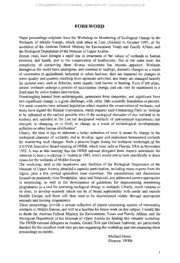
Preview Foreword
© Biologiezentrum Linz/Austria; download unter www.biologiezentrum.at FOREWORD These proceedings originate from the Workshop on Monitoring of Ecological Change in the Wetlands of Middle Europe, which took place at Linz (Austria) in October 1993, at the invitation of the Austrian Federal Ministry for Environment Youth and Family Affairs, and the Biological Department of the Museum of Upper Austria. Recent years have brought a rapid rise in awareness of the values of wetlands to human economy and health, and to the conservation of biodiversity. But at the same time, the complexity of conserving these diverse ecosystems has become apparent. Wetlands throughout the world have undergone, and continue to undergo, dramatic changes as a result of conversion to agricultural, industrial or urban land-use; they are impacted by changes in water quality and quantity resulting from upstream activities; and many are managed heavily for sectoral uses, such as fisheries, water supply, reed harvest or hunting. Even if left alone, natural wetlands undergo a process of successional change, and can only be maintained in a fixed state by active human intervention. Disentangling natural from anthropogenic, permanent from temporary, and significant from non-significant change is a great challenge, with rather little scientific foundation at present. Yet most countries have national legislation which requires the conservation of wetlands, and many have signed the Ramsar Convention, which requires each Contracting Party to "arrange to be informed at the earliest possible time if the ecological character of any wetland in its territory and included in the List (of designated wetlands of international importance) has changed, is changing, or is likely to change as a result of technological developments, pollution or other human interference". Clearly, the time is ripe to elaborate a better definition of what is meant by change in the ecological character of wetlands, and to develop, agree and implement harmonised methods for monitoring such changes. Such a process began during the technical workshops s>J the XXXVth Executive Board meeting of IWRB, which were held in Florida, USA in November 1992. It was at this meeting that the IWRB national delegates from Austria announced the intention to host a workshop in Austria in 1993, which would aim to look specifically at these issues for the wetlands of Middle Europe. The workshop, held in the impressive new facilities of the Biological Department of the Museum of Upper Austria, attracted a capacity participation, including many experts from the region, plus a few invited specialists from elsewhere. The presentations and discussions focused on peatlands, river floodplains, lakes and fishponds, and addressed current approaches to monitoring, as well as the development of guidelines for implementing monitoring programmes as a tool for assessing ecological change in wetlands. Clearly, much remains to be done, to develop methods which can be of broad applicability both inside and outside Middle Europe, and these will then need to be disseminated widely through appropriate manuals and training programmes. These proceedings provide a unique collection of papers concerning aspects of monitoring wetlands in Middle Europe, and will be a baseline for future work on this subject. I would like to thank the Austrian Federal Ministry for Environment, Youth and Family Affairs, and the Biological Department of the Museum of Upper Austria for hosting this valuable workshop. The IWRB national delegates in Austria, Gerald Dick and Gerhard Aubrecht, are particularly thanked for the excellent work they put into organising the workshop, and into preparing these proceedings so rapidly. Michael Moser Director IWRB
